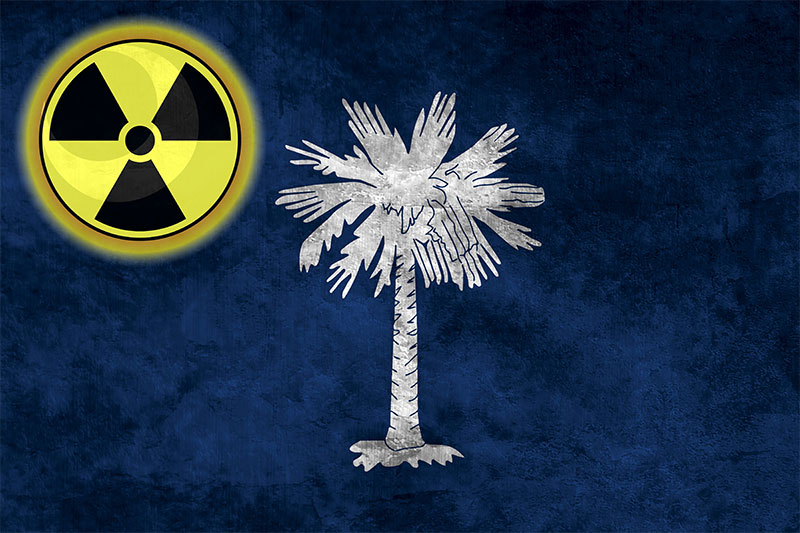
With the signage of the S.C. Energy Security Act H.3309, utilities are moving fast to put natural gas plant construction plans into action.
While the state relies on nuclear reactors for over half of its energy baseload, the failure of V.C. Summer reactors 2 and 3 has oriented utilities away from any immediate reactor revivals or construction.
No nuclear means higher rates
In lieu of 2,200 megawatts V.C. Summer reactors 2 and 3 were supposed to provide, a new natural gas plant in Colleton County will replace an out-of-service coal plant to recreate that baseload. One megawatt equates to 1,000 kilowatts, and South Carolina’s total summer energy capacity in 2022 was 24,286 megawatts (similar to today).
The H.3309 “S.C. Energy Security Act” enshrined a transparent process for utilities to raise rates, and the new construction of natural gas plants will cost ratepayers.
The S.C. Public Service Commission sets the rate of return appropriate for each utility, which guarantees rate increases amidst utility investments in plant construction.
Every new natural gas plant in South Carolina will empower utilities to raise energy rates for customers, with no private investment from data centers or AI going into natural gas plant construction.
New privately-funded nuclear reactors appear to be the vehicle for responsibly addressing a future baseload shortage, especially if data centers continue to see incentives rather than regulations in South Carolina.
However, new nuclear reactors are many years from going online, which is the same story for the revival of V.C. Summer units 2 and 3. Site plans for new reactors at the Cherokee Nuclear Station have been authorized by the Nuclear Regulatory Commission, but more and more natural gas plants are being announced amidst zero nuclear projects moving forward.
My concern is that nuclear energy has an up-hill battle after the mistakes at Georgia Power’s Vogtle nuclear site and V.C. Summer, and that the private investment is not enough at this time; the result being more natural gas plants, pipelines, wetland destruction, higher energy bills, and data centers continuing to amplify that pressure.
Nuclear fleets
To understand the regulatory and investment hurdles nuclear reactors face in South Carolina, I felt it necessary to speak with leading nuclear energy experts in the Carolinas.
To avoid the costs of retooling and redesigns (which happened midway through the construction of V.C. Summer units 2 and 3), experts say a fleet of at least 10 reactors needs to receive approval. An economy of scale for reactors will greenlight private investment and make infrastructure plans practically sound.
South Carolina utilities will need to lobby the nuclear reactor fleet manufacturer, publicly known to be Westinghouse, to receive commitments for one or two reactors.
According to industry experts, a series of nuclear executive orders from the White House helps, and so could the enhanced nuclear project loan guarantees through the Acceleration Reliable Capacity (ARC) Act paired with licensing deregulation in the current 2024 ADVANCE Act, but nuclear reactor projects have ultimately not progressed due to the lack of private investment.
The same can be said for small modular reactors, although smaller and less expensive, will need to be released as a fleet for private investment to be practical.
Because of the large hurdle of initiating a fleet of reactors, there’s less appetite for new construction and more excitement around the completion of V.C. Summer units 2 and 3. Industry experts have said that a revival of units 2 and 3 with private money will empower utilities to return the construction costs from the previous failed construction phase.
The concept of brining nuclear reactor fleets online across the United States instills hope, because this is a reliable nuclear future at scale.
What do South Carolinian's want?
In a recent poll conducted by the South Carolina Policy Council, 58 percent of S.C. voters indicated their support of expanding nuclear energy in the state, including the completion of V.C. Summer reactors 2 and 3.
Rate relief upon the completion of the V.C. Summer revival will be invited, but how high will rates be in a decade due to massive natural gas plant construction for data centers?
In the same SCPC poll, 42% of S.C. voters indicated support for data centers locating to their local communities. Upon learning that their energy bills may increase, 50 percent of those previously supporting data centers in their communities switched to opposing them.
Unfortunately, it’s not enough for ratepaying S.C. residents to wait for the completion of a previously failed nuclear project to see rate relief. More must be done.
















